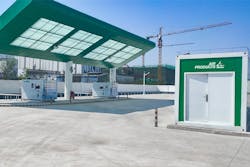Air Products Building 2 Large-Scale Hydrogen Refueling Stations in Germany to Support Heavy-Duty Transportation
Air Products, an industrial gases company, has received funding from the Ministry of Economic Affairs, Industry, Climate Protection, and Energy of the State of North Rhine-Westphalia (NRW) to build two high-capacity, publicly accessible, low-carbon hydrogen refueling stations (HRS) in Duisburg and Meckenheim.
This funding will allow Air Products to provide heavy-duty and long-range vehicles with low-carbon energy, enabling the creation of zero-emission fleets.
"This funding brings heavy-duty vehicle-ready stations to the region. We are excited to be able to support first-mover truck operators looking to test and integrate hydrogen fuel cell trucks into their fleets," said Jorg Homberg, GM for Air Products Germany.
The two stations will be located near Air Products' existing German headquarters in Hattingen. Air Products will build, own, and operate the two high-capacity HRSs, which are capable of fueling a range of vehicles including medium- and heavy-duty classes.
The refueling stations will be supplied by the company's own hydrogen and will offer a network of reliable and fast HRSs for trucks in Germany to support the ramping up of zero-emission fleets.
Air Products currently operates more than 250 hydrogen fueling station projects in 20 countries, with the company's technologies being used in over 1.5 million fueling operations annually. Air Products is currently planning to build large-scale, renewable hydrogen production facilities in Europe to expand the country's network of HRSs. In Germany, these two fueling stations will join a previously announced HRS in Hurth-Knapsack.
NRW aims to decarbonize heavy-duty transportation and has set a target of having 11,000 hydrogen fuel cell trucks in the region by 2030. It has also set additional 2030 goals of having 3,800 fuel cell buses for public transportation and 200 hydrogen fueling stations.
"Hydrogen is an important component for climate-neutral heavy goods transport in North Rhine-Westphalia. In order to be able to rely on emission-free drives in heavy goods transport in the future, we must create the conditions now. The development of hydrogen infrastructure must be significantly accelerated," said Mona Neubaur, Deputy Prime Minister of the State of NRW.





